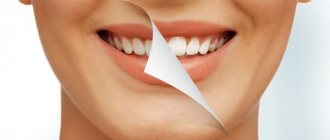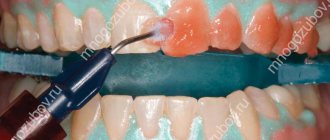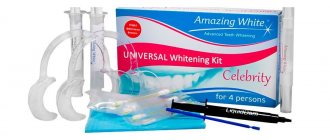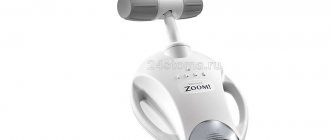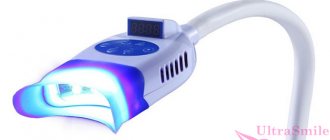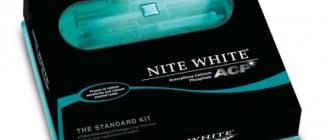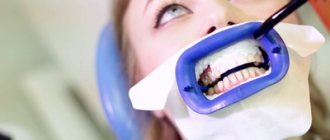There is an opinion among patients that the whitening procedure is harmful and damages tooth enamel.
It's a delusion. The ZOOM-4 whitening procedure has been tested on thousands of patients and confirmed by many years of experience of our doctors. The system does not violate the integrity of tooth enamel. It discolors the pigments found in the tissues of the teeth.
There is also a myth that “the original color returns quickly.” This is not true: if there are no severe hormonal disorders in the human body (for example, diabetes), then the final color is stable for 3-5 years. In this case, it is necessary to follow the recommendations given by the doctor in the first days (7-10 days) after bleaching.
Content:
Zoom 4 is an updated technology of one of the most popular professional teeth whitening systems from Philips. The improved system is considered the safest compared to previous ones, as it contains 10% less hydrogen peroxide (only 25%). The developers of the updated Zoom 4 system managed to find the optimal balance between the effectiveness and safety of whitening. Thanks to this, tooth enamel does not deteriorate or crack.
Zoom 4 is the most effective and safe teeth whitening technology available today. The Zoom 4 technology showed the greatest whitening effect when the enamel darkened due to smoking or consumption of food coloring. The Zoom whitening technique was created in the USA, and, thanks to its many advantages, very soon became popular in other countries.
Whitening results
Several factors influence how bright and light the shade of your teeth will be. The first is smoking. The more cigarettes a patient smokes, the sooner the teeth will darken from nicotine stains. To prevent this from happening, you should either give up the bad habit or regularly undergo professional cleaning.
The second factor is the innate shade of the enamel. There are 16 of them in total, and there are teeth that are very dark by nature. The darker the natural pigment, the more effort you will have to put into bleaching.
The third factor is illness or taking medications that affect the color of teeth (fluorosis, tetracycline antibiotics, etc.). Such stains may be difficult to whiten. The whitening result will last from 3 to 5 years, provided proper and regular care (home hygiene, professional cleaning every six months).
Benefits of Zoom 4 whitening
Gentle whitening.
The Philips ZOOM teeth whitening lamp has a flexible setting system and does not overheat tooth enamel. And the whitening gel contains calcium phosphate to restore enamel, as well as a number of other additional elements that reduce the negative impact on the surface of the teeth and promote its active restoration.
No discomfort.
Many people complain of discomfort during whitening procedures using other technologies. However, when using Zoom 4, discomfort is minimal or absent altogether, thanks to the introduction of new developments and a balanced composition, tooth sensitivity after Zoom 4 whitening is observed for an average of 8 hours, after which the patient practically does not feel any serious discomfort.
Fast procedure and long lasting results.
The whitening procedure using this technology takes an average of 45 minutes. Using Zoom 4, you can achieve 8 to 10 shades of whitening in just one visit to the dentist. And the result after lightening tooth enamel using this technology can last up to 3 years, provided that the doctor’s recommendations are followed.
Approximate daily diet
Individual preferences influence what people eat after teeth whitening. A general recommendation would be to not drink alcohol. Wine contains tannins, and beer contains acids. Strong alcohol penetrates through the enamel pores, damaging the integrity of dentin. Therefore, it is better to exclude alcohol from the list of products for a white diet.
Breakfast
(options):
- porridge (with milk, with water);
- omelette;
- banana smoothie;
- buttered toast;
- classic yogurt;
- cottage cheese.
Dinner:
- mushroom soup;
- baked fish;
- potato;
- vegetable soup (avoid dark vegetables);
- poached chicken;
- chicken broth with dumplings.
Dinner:
- sandwich with chicken or cream cheese;
- pasta with white sauce;
- rice with chicken, fish, mushrooms;
- turkey salad;
- white beans;
- cauliflower.
Snacks:
- yogurt;
- baked apple;
- banana;
- cucumber;
- pear;
- white grapes.
By combining products and coming up with something of your own, you can easily survive for 2 weeks without noticing any restrictions.
It is important to ensure that the diet is complete, with a variety of recipes. For the body, the supply of vitamins and nutrients is important. Monotonous food and strict restrictions can lead to intestinal upset, vitamin deficiency, and demineralization of teeth.
On the other hand, you should not panic if you accidentally ate something that is not recommended to eat after whitening. Brush your teeth or rinse your mouth right away, the main thing is not to repeat the mistakes.
Nutrition principles:
- avoid “colored” foods;
- do not drink alcohol;
- to drink a lot of water;
- subject “doubtful products” to heat treatment.
The white diet is not limited to the list of foods that can be eaten after teeth whitening. The dentist will also give other care tips that will strengthen your teeth and prolong the duration of the procedure.
Contraindications to teeth whitening
Thanks to modern technologies, all possible risks of damage to tooth enamel during the teeth whitening procedure are minimized. However, like any type of professional whitening, Zoom 4 has a number of contraindications, namely:
- Caries and pulpitis. Before the whitening procedure, it is necessary to cure all possible diseases of the oral cavity; — Possible allergic reactions to substances in the whitening gel; — You should refrain from teeth whitening while taking antibiotics and other drugs that increase the enamel’s sensitivity to ultraviolet radiation; — Pregnancy and lactation; — Age up to 16 years; - Presence of tumors.
Questions
Will the procedure harm my teeth?
No. The gel is designed in such a way as to prevent damage to the enamel. All tissues of the oral cavity remain unharmed.
Is it painful to whiten teeth with the ZOOM 4 system?
One of the advantages of this method is minimal discomfort. During the whitening process, the doctor can reduce the intensity of ultraviolet radiation at the request of the patient.
How long does the effect last?
The initially achieved degree of whitening lasts for 1 year. The state of a snow-white smile lasts 3-7 years, depending on nutrition and the degree of oral care.
What preparation is needed before whitening with the ZOOM 4 system?
The patient needs treatment for oral diseases.
How is the Zoom 4 whitening procedure performed?
For the most effective results of teeth whitening, our experts recommend that before the Zoom 4 procedure, you perform comprehensive professional oral hygiene, including remineralization therapy - deep fluoridation of teeth to prevent enamel hypersensitivity.
The Zoom 4 teeth whitening procedure itself takes about 45 minutes and consists of the following steps:
1. Applying a composition to protect the gums. The lips and cheeks are fixed with a retractor, and a photoprotective cream is applied to the soft tissues. A special preparation is also applied to the gums, which immediately hardens in the air.
2. Applying whitening gel. Next, the whitening gel is applied to the tooth enamel and exposed to it using a Zoom LED lamp with different intensity settings. This stage lasts 15-20 minutes, after which the remaining portion of the gel is removed and the manipulations are repeated again until the desired result is obtained (3-4 such procedures may be needed).
3. Removal of the protective composition. After activating the whitening gel with an LED lamp, the doctor removes protective drugs from the surface of the gums, and coats the teeth with a remineralizing gel to restore enamel and reduce tooth sensitivity.
Why are restrictions needed?
After the procedure, tooth enamel:
- Becomes more sensitive
.
Over time, the increased sensitivity goes away, but in the first 48 hours
, the reaction to substances contained in food can be severe. - Even gentle manipulation increases its permeability
. Acids contained in some products may increase the risk of deterioration of the surface layer. - Becomes more porous
. The top layer of dentin is temporarily exposed. Pigments can easily penetrate it and stain it, ruining the entire procedure.
Recommendations after teeth whitening Zoom 4
It is very important to follow a number of doctor’s recommendations after the whitening procedure to maintain the effectiveness of the result. If you follow the recommendations below, Zoom 4 whitening allows you to lighten tooth enamel by 8 - 10 tones, maintaining the result for up to 3 years.
1. For at least 1 week after the Zoom 4 whitening procedure, stop eating foods and drinks that stain your teeth, such as coffee, tea, wine, sweet carbonated drinks, chocolate, carrots, beets, ketchup.
2. Completely eliminate smoking for at least 2 days. It is advisable to reduce the number of cigarettes per day for 1 month.
3. To restore enamel after Zoom 4 whitening, you must use a toothbrush and toothpaste with minimal abrasiveness.
4. It is necessary to regularly visit a dentist for preventive purposes, as well as for professional oral hygiene.
What is possible
Fortunately, the list of products allowed after whitening is quite extensive. It includes:
- White meat
(turkey, chicken),
fish
. They contain no acids or dyes. They provide us with protein without harm to health. - Tofu
. An excellent source of protein for vegetarians and vegans. - Dairy products
without dyes. Classic yogurt, milk without additives, cottage cheese, sour cream will provide you with the calcium you need after the intervention. - Cheeses. It is better to avoid exotic ones due to increased sensitivity.
- Cereals, pasta
and
bread
. Most cereals and pasta are allowed on the “white diet”. Problems can only arise with colored pasta or dumplings made from red flour. - Light fruits and berries
. They provide our body with vitamins. - Light vegetables
. Provide fiber without damaging teeth. - Water
. It definitely won’t leave dark spots or destroy the enamel. It's the best choice for hydration, oral health and a bright smile.
Teeth whitening Zoom 4 in Krasnodar
The teeth whitening system using the latest Zoom 4 system is presented at the Symmetry modern dentistry clinic. Innovative equipment, high-quality certified materials, experienced specialists - all this is a guarantee of high-quality results, a snow-white and healthy smile.
At the Symmetry clinic, the cost of Zoom 4 whitening is one of the most affordable in Krasnodar. In addition, our dentistry now has a promotion for teeth whitening. You can learn more about teeth whitening procedures by scheduling a consultation with our specialists in any way convenient for you: by phone or using the feedback form. More information about the cost of teeth whitening Zoom 4 can be found in the Cost of Services section.
Should I use home whitening products?
It is advisable to use homemade compositions to preserve the whitening results for a long time. But these should not be folk remedies, but professional ones, selected by your dentist. It is necessary to start using such compositions no earlier than 3 months after the professional procedure. It is better if the same system is used that was used in the clinic - for example, ZOOM or Amazing White - these brands provide formulations for use at home. But for this you will need to make individual mouth guards in which the active gel will be placed.
Whitening at home is especially effective for maintaining results after a professional procedure.
When you can’t whiten your teeth using the Zoom protocol
To lighten the tone of the enamel, you need to prepare. It is prohibited to carry out the procedure if:
- caries;
- fillings that need to be urgently replaced;
- oncology;
- severe inflammation of the gums and mucous membranes of the oral cavity;
- unclosed enamel chips;
- allergies to dental compounds to be used;
- pregnancy, as well as during breastfeeding.
